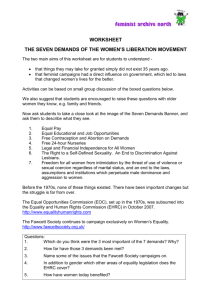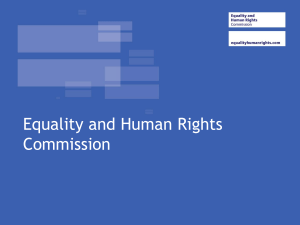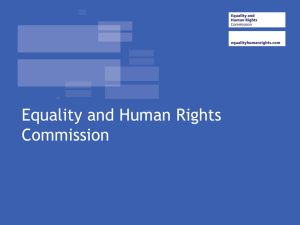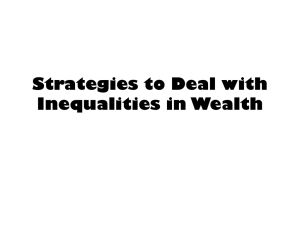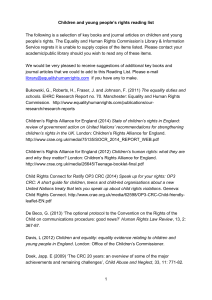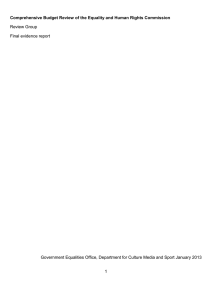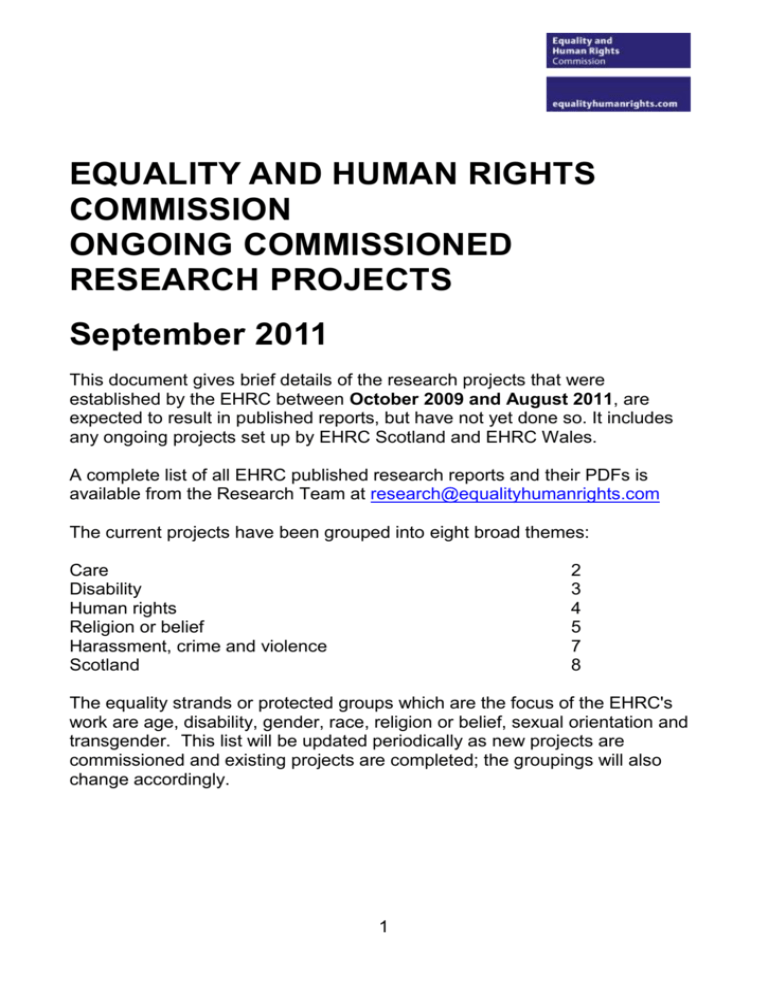
EQUALITY AND HUMAN RIGHTS
COMMISSION
ONGOING COMMISSIONED
RESEARCH PROJECTS
September 2011
This document gives brief details of the research projects that were
established by the EHRC between October 2009 and August 2011, are
expected to result in published reports, but have not yet done so. It includes
any ongoing projects set up by EHRC Scotland and EHRC Wales.
A complete list of all EHRC published research reports and their PDFs is
available from the Research Team at research@equalityhumanrights.com
The current projects have been grouped into eight broad themes:
Care
Disability
Human rights
Religion or belief
Harassment, crime and violence
Scotland
2
3
4
5
7
8
The equality strands or protected groups which are the focus of the EHRC's
work are age, disability, gender, race, religion or belief, sexual orientation and
transgender. This list will be updated periodically as new projects are
commissioned and existing projects are completed; the groupings will also
change accordingly.
1
Care
The human rights of older people needing and receiving home care in
England: interviews with older people in receipt of homecare
Research organisation
Independent Social Research
Researchers
Wendy Sykes and Carola Groom
Purpose of project
To explore the human rights of older people needing and receiving home care
in England. This research forms part of the EHRC's Inquiry into home care for
older people.
Methodology
Interviews with around 40 people aged over 65 in four local authority areas.
Start date
May 2011
EHRC research contact
Liz Speed
Tel: 0161 829 8511
E-mail: Liz.Speed@equalityhumanrights.com
2
Disability
Opening Up Work Opportunities for Disabled People
Research organisation
IFF Research
Researchers
Lorna Adams, Katie Oldfield, Laura Godwin and Charlie Taylor
Purpose of project
To explore disabled people's work aspirations and innovations in job design
and work organisation that break down current barriers and meet needs more
appropriately. The research will inform the EHRC's Working Better
programme.
Methodology
Focus groups and interviews with disabled people.
Start date
September 2010
EHRC research contact
Andrew Nocon
Tel: 0161 829 8505
E-mail: Andrew.Nocon@equalityhumanrights.com
3
Human rights
Development of a Human Rights Measurement Framework
Research organisation
Centre for Analysis of Social Exclusion with Centre for the Study of Human
Rights (London School of Economics)
Research team
Polly Vizard and Tiffany Tsang
Purpose of project
To develop a set of indicators against which to measure human rights
progress in England, Scotland and Wales, and to establish how these
indicators will be measured in the various jurisdictions. The project will also
establish what data are currently available in each jurisdiction and populate
the indicators with these, and make recommendations for future data
development to populate the framework fully.
Methodology
The first stage will involve an international literature review of HR
measurement and indicators and a review of existing sources to assess the
current (and likely future) availability of data. This stage will inform the
development of a conceptual framework for the indicators.
This will be followed by the development of a long list of indicators which will
be consulted on via an email consultation. A further round of consultations,
involving workshops in England, Scotland and Wales, will decide a shortlist of
indicators across the framework.
Start date
October 2009
EHRC research contact
Gwen Oliver
Tel: 0161 829 8514
E-mail: Gwen.Oliver@equalityhumanrights.com
4
Religion or belief
Understanding equality and human rights in relation to Religion or Belief
Research organisation
London Metropolitan University
Researchers
Alice Donald, Philip Leach, Karen Bennett and Aruna Dudhia
Purpose of project
To identify the views of religion or belief stakeholders, employers, service
providers and other equality strands concerning:
the key conflicting interests between strand rights and different human
rights which are linked in some way to religion or belief;
the place of religion or belief at the public table;
the extent and limits of 'reasonable accommodation' of religion or belief in
the workplace;
the issue of parallel legal systems; and
principled approaches to resolving dilemmas and disputes.
Key issues include religious symbols, religious conscience, religious clothing
and freedom of expression and potential clashes between the rights of
religious and non-religious groups, and religious groups and other equality
groups. The project covers England and Wales.
Methodology
A literature review covering relevant case law and wider British and
international research on these issues.
70 telephone interviews with religion or belief organisations, experts in law
and human rights, stakeholders representing other equality strands,
employers, employers' organisations and service providers.
Two online surveys, one focusing on the workplace, and another primarily
aimed at religion or belief stakeholders. Two round table discussion
events, one involving academic legal experts and one health practitioners.
Start date
January 2011
EHRC research contact
Dave Perfect
Tel: 0161 829 8510
E-mail: David.Perfect@equalityhumanrights.com
5
Harassment, crime and violence
Map of Needs
Research organisation
Child and Woman Abuse Studies Unit, (London Metropolitan University) and
GEN
Research team
Liz Kelly, Kerry Lee, Maddy Coy, Sharon Lindsay and Pamela Reid
Purpose of project
Map of Needs will provide a model that will calculate the needs and associated
costs for providing specialised violence against women services for each local
authority area in England, Wales and Scotland. The models will differentiate
between what is needed at local, regional and national levels for each local
authority area across all forms of violence.
Methodology
Phase 1: Desk-based research and consultation with relevant experts/service
providers to identify the best existing indicators and data sources, develop
indicators where they do not exist, and establish core services required to
meet women’s needs.
Phase 2: Developing the models through accessing national data sources that
provide information on population size, demographics, data indentified in the
first phase, urban/rural classifications, and geographical size.
Phase 3: Consultations with stakeholders and service providers in England,
Scotland and Wales. These will involve a focus group in each of the three
countries, as well as online consultations.
Start date
November 2009
EHRC research contact
Gwen Oliver
Tel: 0161 829 8514
E-mail: Gwen.Oliver@equalityhumanrights.com
6
Secondary analysis of the British Crime Survey
Research organisation
Lancaster University
Research team
Paul Iganski and Spridoula Lagou
Purpose of project
To conduct secondary analysis of selective variables of the British Crime
Survey (BCS), in order to reveal fear and experiences of harassment and
crime according to aspects of identity, including: disability, age, sexual
orientation, race and gender.
Methodology
The study will merge sufficient waves of the BCS in order to generate robust
sub-samples, and conduct descriptive and regression analysis. Secondary
analysis of the Scottish Crime and Justice Survey is also being carried out as
part of the project.
Start date
January 2011
EHRC research contact
Fiona Glen
Tel: 0161 829 8506
E-mail: mailto:Fiona.Glen@equalityhumanrights.com
7
Scotland
Investigating the experiences of people trafficked into commercial
sexual exploitation in Scotland
Research organisation
London South Bank University
Researchers
Roger Matthews and Helen Easton
Purpose of project
The research aims to:
better understand the experiences of people who have been trafficked
into commercial sexual exploitation in Scotland; and
analyse the impact of relevant policies and practices on victims of
trafficking (this might include agencies working in asylum and immigration
and law enforcement as well as a range of other service providers who
work with victims of trafficking).
Methodology
The research will investigate three key sources of data:
Primary data involving interviews with women who have been trafficked
for the purposes of CSE, and interviews with key statutory and law
enforcement agencies, and non-governmental organisations in Scotland.
Secondary data based on available statements, transcripts and reports
from the relevant agencies.
Administrative data and documentation.
Start date
October 2010
EHRC research contact
Kathleen Doyle
Tel: 0141 228 5924
E-mail: kathleen.doyle@equalityhumanrights.com
8
Using and developing data to improve local equality outcomes
Partnership organisation
The Improvement Service, the Equality and Human Rights Commission and
Scottish Government
Purpose of project
The three partner organisations will work with 4 local authorities / Community
Planning Partnerships (CPPs) (where appropriate), to meet the challenge of
developing the equalities evidence base in order to identify, measure and track
progress on key outcomes for their area.
This action research project aims to:
Pilot the use of the Equality Measurement Framework as a practical tool to
help Local Authorities and their CPPs better understand how equality
outcomes can be better identified, measured and tracked through SOAs,
performance management and self evaluation frameworks.
Develop concrete, effective and practical solutions to improve the equalities
evidence base at the local level, and pilot a sample of these solutions that
we can tackle within the scope of this project.
Develop a shared understanding of equality and ‘what works’ around
equalities measurement and management for participating councils and the
wider local government and public services community.
Methodology
The starting point for the work is the Commission's Equality Measurement
Framework. The support available will involve actively engaging each
council/CPP in a range of activities, which will work through a detailed outcomes
methodology, tailored to the specific needs of each council/CPP. The hands-on
work and support activities will run over a number or months, commencing
in January 2011 and ending in January 2012.
Start date
November 2010
EHRC research contact
Kathleen Doyle (EHRC Scotland)
Tel: 0141 228 5924
E-mail: kathleen.doyle@equalityhumanrights.com
9
Equality Impact Assessment: reducing negative impact of policy change
on equality groups
Research organisation
ODS Consulting and Unify
Research team
Andrew Fyfe, Ali Jarvis, Kate McMillan and Steven Reid
Purpose of project
A study to assess the extent to which a sample of Scottish public authorities
have, through Equality Impact Assessment (EIA) activity (a) identified a need
for mitigation action to be taken and (b) can supply evidence that such
mitigation action has been put in place and has been successful in addressing
the negative impact identified. The research focuses on two sectors: police
forces and education authorities (focusing on primary schools).
Methodology
There are two stages to this study. Stage 1 involves a sweep of all police
forces and education authorities requesting information on Equality Impact
Assessments pursued during financial years 2009/10 and 2010/11. This will
give general information to inform the specific focus in Stage 2. In Stage 2 up
to a maximum of twenty public authorities (police forces and education
authorities) will be studied in more detail, including analysis of EIAs and
interviews with public authorities to capture a fuller picture of current practice.
Start date
August 2011
EHRC research contact
Suzi Macpherson
Tel: 0141 228 5948
E-mail: Suzi.Macpherson@equalityhumanrights.com
10

